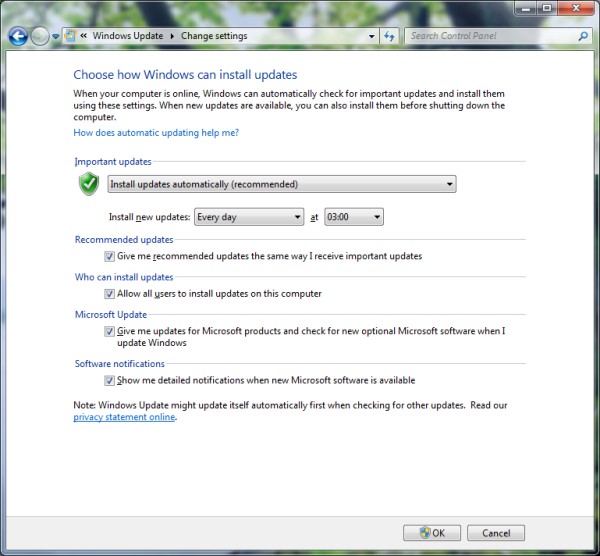Ian Bell over at Digital Trends caught my attention when he repeatedly claimed that some users who have Windows Update configured a certain way would get Bing Desktop automatically.
The article in question is a review of Bing Desktop - which is basically an application which places a search box on your desktop, along with the Bing image of the day as your wallpaper. Straight forward enough right, they take some pot shots at it - they're a pretty anti-Microsoft website. The author of the article however accurately stated that it is an "optional" update.
Digital Trends CEO, however commented several times on the article:
It's not optional for everyone. There is an option to have Windows automatically add ALL updates when they are available. Its the first thing Windows asked on a new computer. So some people are getting it installed whether they really want it or not.
The problem I have with this is how Microsoft is pushing it to users. Some people have Windows setup to automatically install ALL updates. Well, this isn't an update, its a new feature and it shouldn't be pushed to consumer desktops through this manner. Shame on Microsoft for getting desperate here.
Oh, and cant wait for some press release to come out next month saying that Bing has grown 2000% in the last month (since this update was pushed).
Nice.
And dead wrong. The guy lacks even the most basic understanding of how Windows Update works. Yet loudly proclaims his misconceptions as fact to further push his bias agenda.
Windows Update breaks updates into three categories.
Important - security fixes.
Recommended - bug fixes, updates to .NET Framework, etc.
Optional - extra things like language packs, Bing Desktop, updates to Zune, Windows Live Essentials and device drivers etc.
There are several settings which control how updates are installed and if they're installed automatically.

Microsoft, wisely recommend that important updates are installed automatically. You can also, if you opt-in, tell it to install recommended updates automatically. Considering this is usually for bug fixes in Windows, and to update various optional components of Windows, this is usually a good idea.
There's also the option, again opt-in, for getting updates from Microsoft Update. If checked this allows other Microsoft software like Office, Zune, Windows Live Essentials and Bing Desktop in this case to use/appear on Windows Update to get their own updates seamlessly too or present themselves to end-users.
Under no circumstances are these optional updates ever installed automatically, nor is there any setting which in the slightest implies they are. The FAQ in Help and Support clearly states this:
You can set Windows to automatically install important and recommended updates, or to install important updates only. Important updates provide significant benefits, such as improved security and reliability. Recommended updates can address non-critical problems and help enhance your computing experience. Optional updates are not downloaded or installed automatically. For more information, see Turn automatic updating on or off and Change how Windows installs or notifies you about updates.
Quite clear. No Windows user will wake up one morning and have Bing Desktop sneakily installed on their computer, you need to make at least seven mouse clicks to tell Windows to download it, not counting the clicks required to finish installing it.
So pack it in with the baseless anti-Microsoft rhetoric.